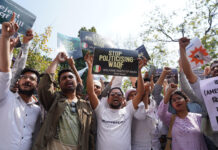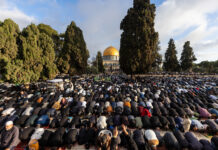Police in the northern state of Uttar Pradesh have filed criminal cases against hundreds of Muslims for wearing black armbands during religious prayers — a symbolic act of protest against a controversial bill impacting Muslim endowments.
The demonstration, held during Friday and Eid prayers inside mosque compounds in Muzaffarnagar, was entirely peaceful, say participants. Protesters did not chant slogans or gather in public spaces.
Yet, authorities have accused them of “disrupting peace” and “inciting the public,” according to legal notices reviewed by local news media.
The notices, issued under Section 130 of India’s Civil Defence Code, claim that wearing black armbands could “spread misinformation” and potentially disturb public order in the future.
All those named in the case have been directed to appear in court on April 16, and submit personal surety bonds worth Rs 2 lakh (approx. $2,400 USD) each.
Among those booked is Naeem Tyagi, principal of Madrasa Mahmudiya, who reportedly did not even participate by wearing an armband. “I was inside the madrasa during the prayers. I didn’t wear any black band. Yet I received a notice,” he told local media.
The crackdown has sent ripples of anxiety across several Muslim-majority districts in Uttar Pradesh, including Lucknow, Sambhal, Meerut, Moradabad, Amroha, Rampur, Aligarh, Agra, Bareilly, Firozabad and Shamli.
Subscribe to our newsletter and stay updated on the latest news and updates from around the Muslim world!
As tensions mount, security forces have been deployed in sensitive areas. On Thursday, senior police officials — including Muzaffarnagar SSP Satyanarayan Prajapat and DIG of Saharanpur — led a flag march through key neighbourhoods, citing efforts to “maintain law and order.”
The protest was in response to the Waqf Amendment Bill, recently passed by both Houses of India’s Parliament. Critics argue that the legislation could severely undermine the autonomy of Waqf boards —bodies that oversee Muslim charitable properties, including mosques, graveyards and schools.
Legal experts and civil society groups warn that such laws, coupled with heavy-handed policing, could further stifle the rights of India’s Muslim minority, already facing growing marginalisation under the current administration.
Meanwhile, the All India Muslim Personal Law Board (AIMPLB) has condemned the controversial Waqf amendment bill passed by the Indian parliament and declared a nationwide protest and legal battle to overturn the “unjust legislation.”
The board, an NGO established to protect Muslims’ interests in matters of personal law, has called on Muslims to take action to oppose the amended legislation, announcing that the board will “lead a nationwide movement against these amendments in coordination with all religious, community-based, and social organisations, and the campaign will continue until the amendments are fully repealed.”
Despite criticism and opposition from other parties, the Indian parliament, led by the right-wing Hindu nationalist Bhartiya Janata Party (BJP), on Friday passed the controversial bill governing Islamic charitable endowments, known as waqf.
Waqf properties, which Muslims donate for religious or charitable purposes, include mosques, graveyards, seminaries, orphanages, schools, markets, and large tracts of land throughout India.
“The Board will not only take the legal route to challenge these discriminatory and unjust amendments in the Supreme Court but will also employ all democratic and peaceful means of protest, including demonstrations, symbolic protests such as wearing black armbands, roundtable meetings with fellow citizens, and press conferences,” said the AIMPLB statement.
The organisation added that in each state’s capital, Muslim community leaders will “offer symbolic arrests” and organise protests in districts, culminating in the submission of memoranda to the President of India and the Home Minister via the respective District Magistrates and Collectors.
























